The first graduating class of Master's Degree in Christianity and Contemporary Culture concludes its first course.
With this program, the School of Philosophy y Letras disembarked at campus in Madrid in September 2022.

PhotoManuelCastells/Students of the first MCCC graduating class on the first day of class
Last September, the School of Philosophy and Letters began its journey at campus of the University of Navarra in Madrid with the Master's Degree in Christianity and Contemporary Culture (MCCC). average The first graduating class of the two-year program is made up of 38 students from five countries - Spain, Mexico, Germany, Colombia and Argentina - with an age of 50 years, who have combined their programs of study with their professions in a wide range of fields: teaching, communication, management, law, priesthood, medicine or engineering.
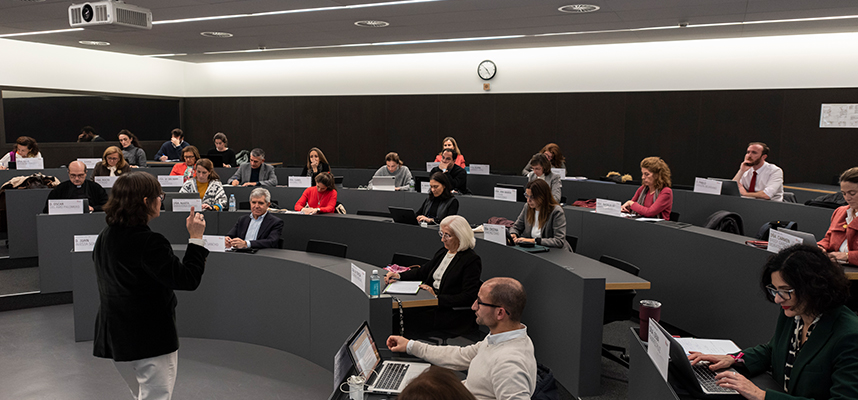
MCCC students at campus of Madrid
María Teresa Gismero is one of these students belonging to the first graduating class. A teacher at teaching Primary School for many years, and now retired, she coordinates a School of Evangelization in Madrid. She says that, for some time, "I felt a great frustration for not understanding today's world and a great sorrow to see the values of the society that my grandchildren will inherit". This program, as she explains, has helped her to gain some keys to understand today's world more deeply and to look at it "in a more understanding and, at the same time, more compassionate way". He maintains that, to be trained in the issues addressed by the MCCC, "you need systematization and good teachers to help you acquire a critical vision of the world, focused and thorough, and this program is the result of years of reflection and effort, I know. For me, having been able to study it has been a gift of life".
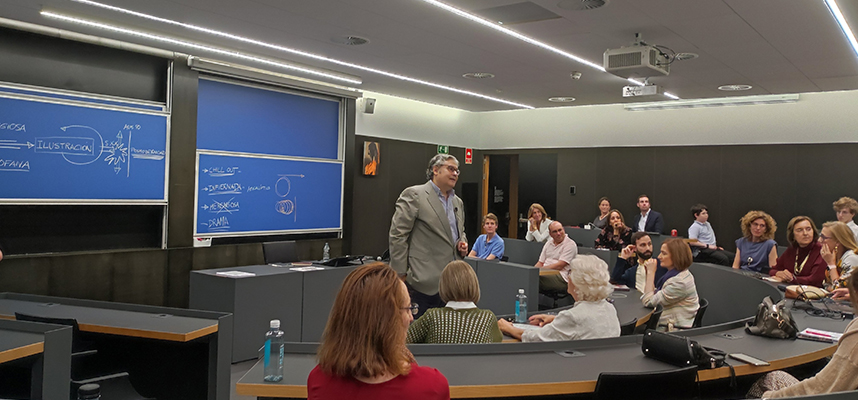
During the intensive week they had a session with the writer Juan Manuel de Prada.
Mario Vera has traveled more than 3,000 kilometers a week to attend to attend MCCC classes. A priest in the diocese of Cologne (Germany), he says he decided to enroll in Master's Degree to reflect on the changes in society from a Christian vision of reality. "One of the most valuable things that the program is giving me is to discover the various connections that exist between different areas of the contemporary world that, at first glance, are not noticeable. In addition, the opinions and points of view of my classmates have been of great value." He considers that training in these matters is very important, "because in order to be able to dialogue with the contemporary world (and evangelize it) we must try to understand it to the best extent possible".
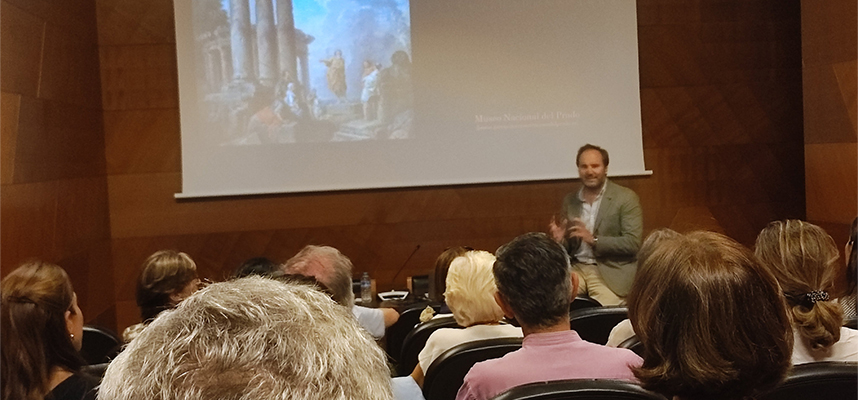
In a visit to the Prado Museum, guided by Jaime García Máiquez, technician of the Technical Documentation Office.
Isabel Antúnez is a civil engineer and decided to take the MCCC because she had been wanting to delve into more humanistic issues that would complement her training and her professional experience: "The transversal vision of the contemporary world offered by this Master's Degree fit perfectly with what I was looking for. Knowing in an academic way, with order and rigor, how historical facts, technological advances, philosophical thoughts or religion are connected is fundamental to understand our society today".
From this first course, Isabel also highlights the "Encounters" that the Master's Degree in Christianity and Contemporary Culture has organized monthly with experts from fields such as science, Philosophy, theology, Education or culture. "Both the professors and the guests at the conferences have put their experience and knowledge, permanently updated, at the service of the students. It has been a luxury.
The future of monarchies, the transcendence of art, the new masculinity, the bequest of Benedict XVI, or the relevance of Chesterton's work are some of the topics that have been addressed to date. The sessions are available at link.
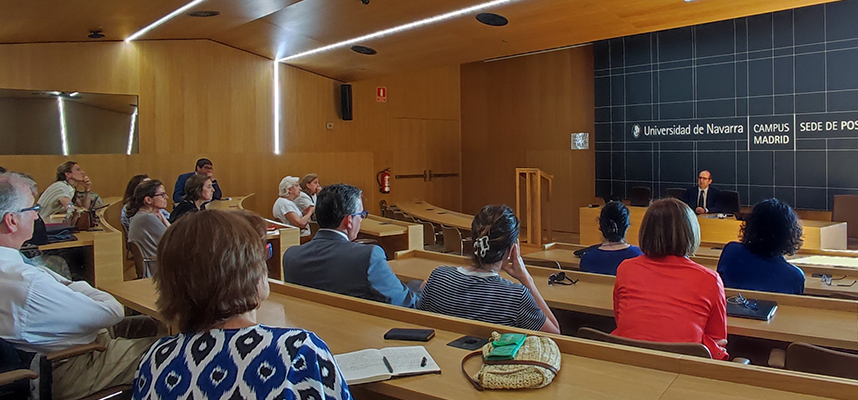
With Higinio Marín, philosopher and President of the CEU Cardenal Herrera University, during the intensive week
Another of the students belonging to this first graduating class is Jesús Hueso, teacher of Philosophy and Religion in Secondary School. After a few years practicing teaching, he wanted to update his philosophical knowledge from a Christian perspective. "As soon as I heard about MCCC, which addressed the central questions of postmodernity, I had no doubts," he says. After having made a theoretical, philosophical and theological approach to the understanding of development of contemporary culture, he assures that he has obtained the necessary tools to be able to establish a discussion with the thought of our time. For all these reasons, he does not hesitate to recommend Master's Degree to those who are considering it: "For those who do not have much previous philosophical or theological knowledge, at the beginning it may be demanding to be introduced to the specific language of this knowledge, but they will have a great team of professors and academic coordinators who will offer them a great personalized follow-up and financial aid ".
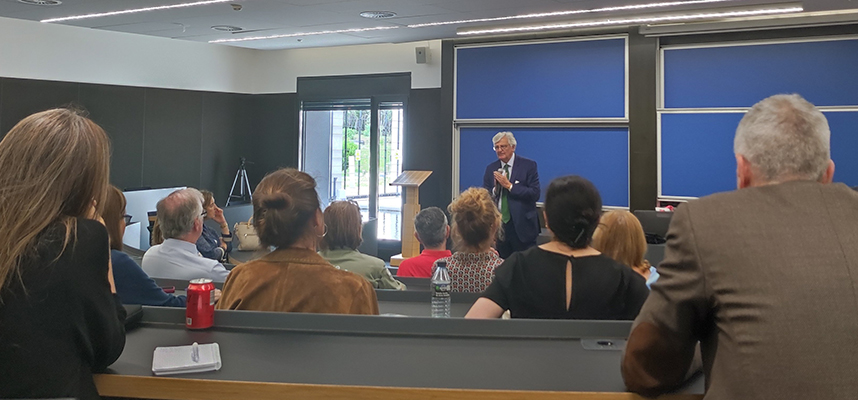
During the cinema forum with Eduardo Torres Dulce
For his part, Professor Mariano Crespo, director academic of the MCCC, said that this first course "has far exceeded our expectations": "We have found a very diverse group of students, eager to learn and think about the challenges that contemporary culture presents to Christianity and the message of optimism and hope that it offers".
Intensive week with experts from various fields
visit To close the program, from June 19 to 23 the students participated in an intensive week that included, among other educational activities, a visit to the Prado Museum guided by Jaime García-Máiquez, a technician from the Technical Documentation Office of the national art gallery, a film forum with Eduardo Torres-Dulce, former attorney general and film critic; a film forum with Eduardo Torres-Dulce, former attorney general and film critic; a session on the future of the presence of Christianity in literature with the writer Juan Manuel de Prada; or a visit to the main monuments of Toledo, guided by Daniel Gómez Aragonés. "It has been a particularly enriching experience," concludes Professor Crespo.
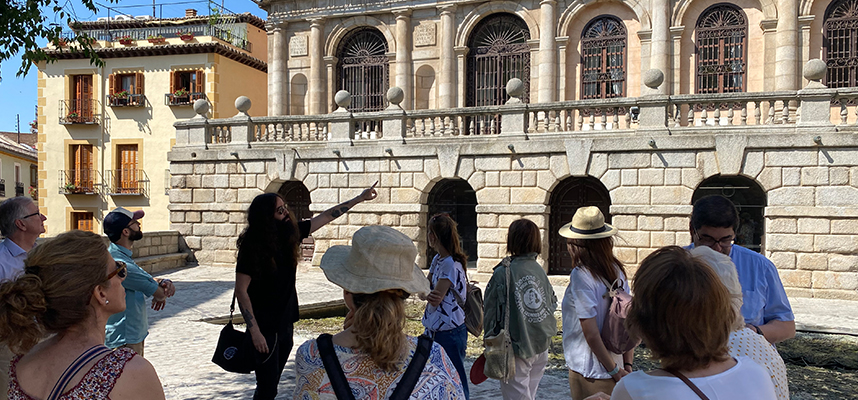
In Toledo, in a guided visit that they had during the intensive week




